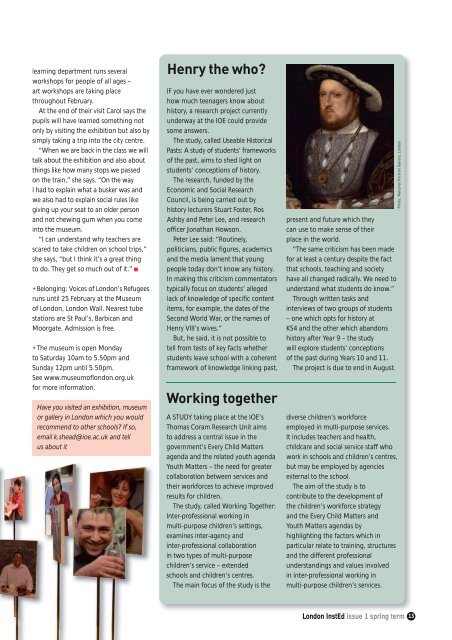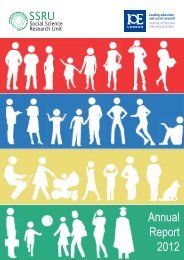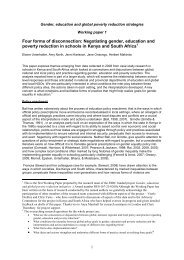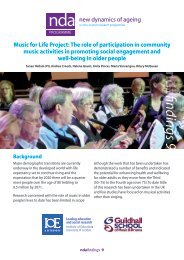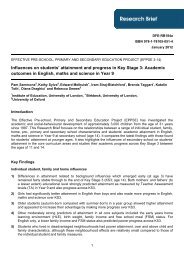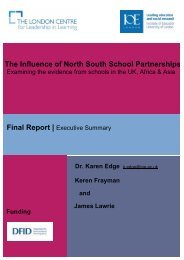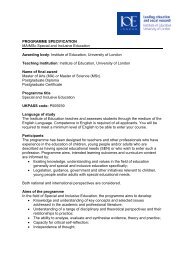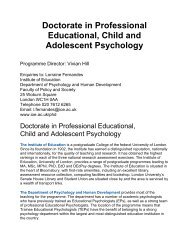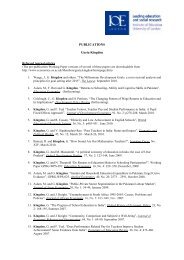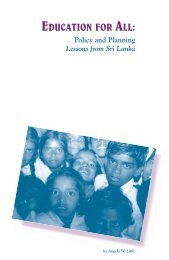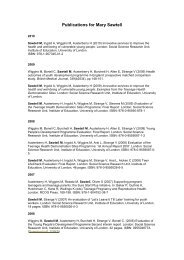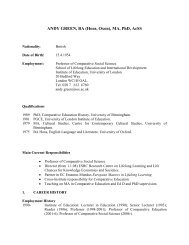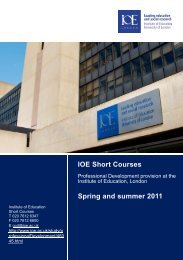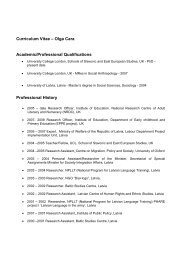Issue 1 - Institute of Education, University of London
Issue 1 - Institute of Education, University of London
Issue 1 - Institute of Education, University of London
Create successful ePaper yourself
Turn your PDF publications into a flip-book with our unique Google optimized e-Paper software.
learning department runs several<br />
workshops for people <strong>of</strong> all ages –<br />
art workshops are taking place<br />
throughout February.<br />
At the end <strong>of</strong> their visit Carol says the<br />
pupils will have learned something not<br />
only by visiting the exhibition but also by<br />
simply taking a trip into the city centre.<br />
“When we are back in the class we will<br />
talk about the exhibition and also about<br />
things like how many stops we passed<br />
on the train,” she says. “On the way<br />
I had to explain what a busker was and<br />
we also had to explain social rules like<br />
giving up your seat to an older person<br />
and not chewing gum when you come<br />
into the museum.<br />
“I can understand why teachers are<br />
scared to take children on school trips,”<br />
she says, “but I think it’s a great thing<br />
to do. They get so much out <strong>of</strong> it.”<br />
Belonging: Voices <strong>of</strong> <strong>London</strong>’s Refugees<br />
runs until 25 February at the Museum<br />
<strong>of</strong> <strong>London</strong>, <strong>London</strong> Wall. Nearest tube<br />
stations are St Paul’s, Barbican and<br />
Moorgate. Admission is free.<br />
The museum is open Monday<br />
to Saturday 10am to 5.50pm and<br />
Sunday 12pm until 5.50pm.<br />
See www.museum<strong>of</strong>london.org.uk<br />
for more information.<br />
Have you visited an exhibition, museum<br />
or gallery in <strong>London</strong> which you would<br />
recommend to other schools? If so,<br />
email k.shead@ioe.ac.uk and tell<br />
us about it<br />
Henry the who?<br />
IF you have ever wondered just<br />
how much teenagers know about<br />
history, a research project currently<br />
underway at the IOE could provide<br />
some answers.<br />
The study, called Useable Historical<br />
Pasts: A study <strong>of</strong> students’ frameworks<br />
<strong>of</strong> the past, aims to shed light on<br />
students’ conceptions <strong>of</strong> history.<br />
The research, funded by the<br />
Economic and Social Research<br />
Council, is being carried out by<br />
history lecturers Stuart Foster, Ros<br />
Ashby and Peter Lee, and research<br />
<strong>of</strong>ficer Jonathan Howson.<br />
Peter Lee said: “Routinely,<br />
politicians, public figures, academics<br />
and the media lament that young<br />
people today don’t know any history.<br />
In making this criticism commentators<br />
typically focus on students’ alleged<br />
lack <strong>of</strong> knowledge <strong>of</strong> specific content<br />
items, for example, the dates <strong>of</strong> the<br />
Second World War, or the names <strong>of</strong><br />
Henry VIII’s wives.”<br />
But, he said, it is not possible to<br />
tell from tests <strong>of</strong> key facts whether<br />
students leave school with a coherent<br />
framework <strong>of</strong> knowledge linking past,<br />
Working together<br />
A STUDY taking place at the IOE’s<br />
Thomas Coram Research Unit aims<br />
to address a central issue in the<br />
government’s Every Child Matters<br />
agenda and the related youth agenda<br />
Youth Matters – the need for greater<br />
collaboration between services and<br />
their workforces to achieve improved<br />
results for children.<br />
The study, called Working Together:<br />
Inter-pr<strong>of</strong>essional working in<br />
multi-purpose children’s settings,<br />
examines inter-agency and<br />
inter-pr<strong>of</strong>essional collaboration<br />
in two types <strong>of</strong> multi-purpose<br />
children’s service – extended<br />
schools and children’s centres.<br />
The main focus <strong>of</strong> the study is the<br />
present and future which they<br />
can use to make sense <strong>of</strong> their<br />
place in the world.<br />
“The same criticism has been made<br />
for at least a century despite the fact<br />
that schools, teaching and society<br />
have all changed radically. We need to<br />
understand what students do know.”<br />
Through written tasks and<br />
interviews <strong>of</strong> two groups <strong>of</strong> students<br />
– one which opts for history at<br />
KS4 and the other which abandons<br />
history after Year 9 – the study<br />
will explore students’ conceptions<br />
<strong>of</strong> the past during Years 10 and 11.<br />
The project is due to end in August.<br />
diverse children’s workforce<br />
employed in multi-purpose services.<br />
It includes teachers and health,<br />
childcare and social service staff who<br />
work in schools and children’s centres,<br />
but may be employed by agencies<br />
external to the school.<br />
The aim <strong>of</strong> the study is to<br />
contribute to the development <strong>of</strong><br />
the children’s workforce strategy<br />
and the Every Child Matters and<br />
Youth Matters agendas by<br />
highlighting the factors which in<br />
particular relate to training, structures<br />
and the different pr<strong>of</strong>essional<br />
understandings and values involved<br />
in inter-pr<strong>of</strong>essional working in<br />
multi-purpose children’s services.<br />
<strong>London</strong> InstEd issue 1 spring term 13<br />
Photo: National Portrait Gallery, <strong>London</strong>


